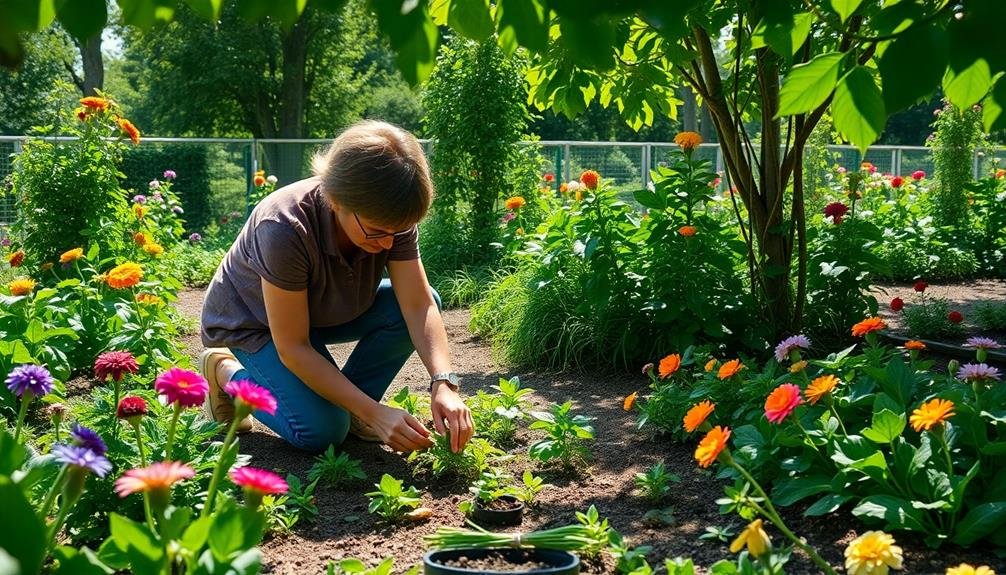You'll find three anxiety-friendly volunteer roles perfect for nervous helpers. As an Animal Shelter Assistant, you can work with pets in a calm environment, feeding and socializing animals. Virtual Tutoring Support allows you to help students from the comfort of your home, reducing face-to-face pressure. Community Garden Helper offers a chance to connect with nature, working independently or in small groups on tasks like planting and weeding. These roles provide flexible schedules, minimal social pressure, and a sense of accomplishment. Each opportunity offers unique benefits for managing anxiety while making a positive impact. Explore these options to discover which role suits you best.
Animal Shelter Assistant

If you're an animal lover, volunteering at an animal shelter can be a great low-stress option. As an animal shelter assistant, you'll have the opportunity to work with cats, dogs, and other small animals in a calm environment. Your tasks may include feeding, grooming, and socializing with the animals, which can be therapeutic for those with anxiety.
Many shelters offer flexible schedules, allowing you to choose shifts that suit your comfort level. You can start with shorter sessions and gradually increase your time as you become more comfortable.
Working with animals often provides a sense of purpose and accomplishment without the pressure of constant human interaction.
Shelters typically provide training, so you don't need prior experience. You'll learn proper handling techniques and safety protocols, which can boost your confidence.
Some roles, like folding laundry or organizing supplies, offer quiet, solitary tasks if you prefer minimal social interaction.
Virtual Tutoring Support
Virtual tutoring support offers a perfect opportunity for those with anxiety to make a difference from the comfort of their own homes. You can help students of all ages improve their academic skills without the pressure of face-to-face interactions.
Many organizations offer virtual tutoring programs, allowing you to choose subjects you're passionate about and comfortable teaching.
To get started, research reputable online tutoring platforms or local schools offering virtual support. You'll typically need a reliable internet connection, a computer with a webcam, and any necessary software.
Once you've signed up, you'll be matched with students based on your expertise and availability.
Here's what virtual tutoring support might involve:
- Helping students understand challenging concepts in subjects like math, science, or literature
- Assisting with homework assignments and test preparation
- Providing encouragement and building students' confidence in their abilities
- Adapting teaching methods to suit individual learning styles
Community Garden Helper

For those who prefer a more hands-on approach to volunteering, community garden helper roles offer a fantastic opportunity to connect with nature and contribute to local food sustainability.
You'll find these roles less anxiety-inducing as they often involve working independently or in small groups, allowing you to focus on tasks without excessive social pressure.
As a community garden helper, you'll engage in activities like planting seeds, weeding, watering, and harvesting produce.
These repetitive, calming tasks can help reduce stress and anxiety while providing a sense of accomplishment. You'll also learn valuable gardening skills and gain knowledge about sustainable food production.
Many community gardens welcome volunteers with varying levels of experience, so don't worry if you're new to gardening.
You can start with simple tasks and gradually take on more responsibilities as you become comfortable.
The flexible nature of these roles often allows you to choose your preferred working hours, making it easier to manage your anxiety levels.
Frequently Asked Questions
How Can I Manage Anxiety During Face-To-Face Interactions With Other Volunteers?
You can manage anxiety during face-to-face interactions by practicing deep breathing, focusing on active listening, and reminding yourself of your shared goals. Try arriving early to acclimate, and don't hesitate to take breaks when needed.
Are There Any Specific Anxiety-Reducing Techniques Recommended for Volunteer Work?
You can try deep breathing exercises, mindfulness meditation, or progressive muscle relaxation before and during volunteer work. It's also helpful to practice positive self-talk, set realistic expectations, and take regular breaks when you're feeling overwhelmed.
What if I Need to Take a Break Due to Anxiety?
If you're feeling anxious, it's okay to take a break. Let your supervisor know you need a moment. Step away, practice deep breathing, or find a quiet spot. Don't hesitate to prioritize your well-being during volunteer work.
Can I Volunteer Remotely if My Anxiety Prevents In-Person Participation?
Yes, you can definitely volunteer remotely if anxiety prevents in-person participation. Many organizations offer virtual opportunities like online tutoring, social media management, or data entry. You'll find plenty of ways to contribute from the comfort of your home.
How Do I Communicate My Anxiety-Related Needs to Volunteer Coordinators?
You should be honest with volunteer coordinators about your anxiety. Explain your specific needs and limitations clearly. Ask about accommodations they can provide. Don't hesitate to discuss potential triggers and strategies that help you manage your anxiety.
In Summary
You've got options to make a difference, even if anxiety sometimes holds you back. Whether you're cuddling cats, tutoring online, or tending to plants, these roles let you contribute at your own pace. Remember, it's okay to start small and build confidence gradually. Don't be afraid to communicate your needs to volunteer coordinators. They'll appreciate your willingness to help. By taking that first step, you're not just helping others – you're also challenging your anxiety and growing stronger.





Leave a Reply